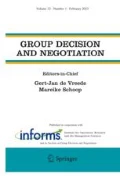Abstract
Integrity of government organizations and institutions is one of the key pillars of successful democracy. In this paper we present an approach to perform an integrity assessment in a group setting. We present a case study in which we trained two groups of practitioners to execute the integrity risk assessment according to the Collaboration Engineering approach to collaboration support. We compared their effort and results with the assessment executed by professional facilitators. For this comparison we collected data mainly from a participant perspective. The preliminary results show that there is no significant difference between the performance of the practitioners and the professional facilitators.
Similar content being viewed by others
References
Ackermann F (1996) Participants perceptions on the role of facilitators using group decision support systems. Group Decis Negot 5:93–519
Alexander C (1979) The timeless way of building. Oxford University Press, New York
BIOS (2007) website BIOS. from http://www.integriteitoverheid.nl/bios
Bostrom RP, Anson R (1992) The face-to-face electronic meeting: a Tutorial’. In: Bostrom RP, Watson RT, Kinney ST (eds) Computer augmented teamwork: a guided tour. Van Nostrand Reinhold, New York, pp 16–33
Briggs RO, de Vreede GJ, Nunamaker JF Jr, David TH (2001) ThinkLets: achieving predictable, repeatable patterns of group interaction with group support systems. Hawaii International Conference on System Sciences, Los Alamitos
Briggs RO, de Vreede GJ, Nunamaker JF Jr (2003) Collaboration engineering with ThinkLets to pursue sustained success with group support systems. J Manag Inf Syst 19:31–63
Briggs RO, Reinig BA, de Vreede GJ (2006) Meeting satisfaction for technology-supported groups: an emperical validation of a goal-attainment model. Small Group Research, 37
Buitenhuis het (2007) website het buitenhuis. from http://www.het-buitenhuis.nl
Cohen J (1988) Statistical power analysis for the behavioural sciences. Erlbaum, Hillsdale, NJ
de Vreede GJ, Briggs RO (2005) Collaboration engineering: designing repeatable processes for high-value collaborative tasks. Hawaii International Conference on System Science, Los Alamitos
de Vreede GJ, Briggs RO, Kolfschoten GL (2006) ThinkLets: a pattern language for facilitated and practitioner-guided collaboration processes. Int J Comput Appl Technol 25:140–154
de Vreede GJ, Briggs RO, Massey AP (2009) Collaboration engineering: foundations and opportunities: editorial to the special issue on the journal of the association of information systems. J Assoc Inf Syst 10(3):121–137 (7)
Duivenvoorde GPJ, Kolfschoten GL, de Vreede GJ, Briggs RO (2009) Towards an instrument to measure successfulness of collaborative effort from a participant perspective. Hawaii International Conference on System Science, Waikoloa
Fjermestad J, Hiltz SR (2001) A descriptive evaluation of group support systems case and field studies. J Manag Inf Syst 17:115–159
Gamma E, Helm R, Johnson R, Vlissides J (1995) Elements of reusable object-oriented software. Addison-Wesley Publishing Company, Boston
Kolfschoten GL (2007) Theoretical foundations for collaboration engineering. Delft University of Technology, Delft
Kolfschoten GL, de Vreede GJ (2009) A design approach for collaboration processes: a multi-method design science study in collaboration engineering. J Manag Inf Syst (in press)
Kolfschoten GL, Rouwette E (2006) Choice criteria for facilitation techniques: a preliminary classification. In: International conference on group decision and negotiation, Karlsruhe
Kolfschoten GL, Briggs RO, de Vreede GJ, Jacobs PHM, Appelman JH (2006) Conceptual foundation of the ThinkLet concept for collaboration engineering. Int J Hum Comput Sci 64:611–621
Kolfschoten GL, Lukosch SG, Verbraeck A, Valentin E (2010a) Cognitive learning efficiency through the use of design patterns in teaching. Comput Educ 54:652–660
Kolfschoten GL, de Vreede GJ, Briggs RO, Sol HG (2010b) Collaboration engineerability. Group Decis Negot 19:301–321
Kolfschoten GL, de Vreede GJ, Pietron L (2011) A training approach for the transition of repeatable collaboration processes to practitioners. Group Decis Negot 20:347–371
Kolfschoten GL, van der Hulst S, den Hengst M, de Vreede GJ (2012a) Collaboration process design transition to practitioners: requirements from a cognitive load perspective. Int J e-Collab 8(3):36–55
Kolfschoten GL, Niederman F, de Vreede GJ, Briggs RO (2012b) Facilitation roles and responsibilities for sustained collaboration support in organizations. J Manag Inf Syst 28(4):129–161
Nunamaker JF Jr, Briggs RO, Mittleman DD, Vogel D, Balthazard PA (1997) Lessons from a dozen years of group support systems research: a discussion of lab and field findings. J Manag Inf Syst 13:163–207
Sweller J (1988) Cognitive load during problem solving: effects on learning. Cogn Sci 12:257–285
Yoong P (1995) Assessing competency in GSS skills: a pilot study in the certification of GSS facilitators. SIGCPR
Acknowledgments
The authors acknowledge ‘het Buitenhuis’ and the Dutch National Integirty Office for sponsoring the research project. The authors thank Gert-Jan de Vreede and Robert O. Briggs for their guidance in this research project.
Author information
Authors and Affiliations
Corresponding author
Rights and permissions
About this article
Cite this article
Kolfschoten, G.L., Kosterbok, J. & Hoekstra, A. A Transferable ThinkLet Based Process Design for Integrity Risk Assessment in Government Organizations. Group Decis Negot 24, 595–611 (2015). https://doi.org/10.1007/s10726-014-9402-x
Published:
Issue Date:
DOI: https://doi.org/10.1007/s10726-014-9402-x




